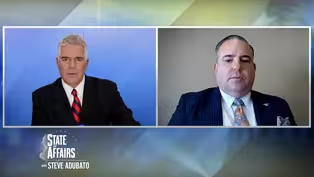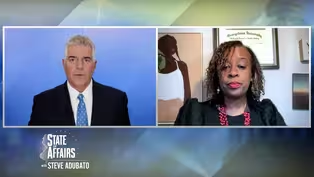State of Affairs with Steve Adubato
Misconceptions about vaccines for preventable illnesses
Clip: Season 9 Episode 7 | 9m 21sVideo has Closed Captions
Misconceptions about vaccines for preventable illnesses
Steve Adubato is joined by Lucy Pereira-Argenziano, MD, Senior VP & Chief Quality Officer for the Northern Region and Chief Medical Officer for Ambulatory Services at Hackensack Meridian Health, to discuss the misconceptions of vaccines for preventable illnesses.
Problems playing video? | Closed Captioning Feedback
Problems playing video? | Closed Captioning Feedback
State of Affairs with Steve Adubato is a local public television program presented by NJ PBS
State of Affairs with Steve Adubato
Misconceptions about vaccines for preventable illnesses
Clip: Season 9 Episode 7 | 9m 21sVideo has Closed Captions
Steve Adubato is joined by Lucy Pereira-Argenziano, MD, Senior VP & Chief Quality Officer for the Northern Region and Chief Medical Officer for Ambulatory Services at Hackensack Meridian Health, to discuss the misconceptions of vaccines for preventable illnesses.
Problems playing video? | Closed Captioning Feedback
How to Watch State of Affairs with Steve Adubato
State of Affairs with Steve Adubato is available to stream on pbs.org and the free PBS App, available on iPhone, Apple TV, Android TV, Android smartphones, Amazon Fire TV, Amazon Fire Tablet, Roku, Samsung Smart TV, and Vizio.
Providing Support for PBS.org
Learn Moreabout PBS online sponsorship[INSPRATIONAL MUSIC STING] - Welcome back, folks.
We're having an important conversation about vaccines, what you need to know.
You'll see the graphic come up.
It's an ongoing initiative we're involved in.
We kick off with Dr. Lucy Pereira-Argenziano, who is a senior vice president, chief quality officer of the Northern Region at Hackensack Meridian Health, our healthcare partner in this initiative together with the New Jersey Department of Health.
And their website will be up as well.
Doctor, good to see you.
- That's wonderful.
Thank you for having me.
- Well, listen, listen, we've been having offline conversations about this.
Vaccines, we're doing this in late March.
It'll be seen many months after that.
What do we need to know about vaccines first, please?
- Yeah, absolutely.
So vaccines are incredibly important.
It allows our immune system to recognize and protect us against infections.
Once we receive a vaccination, our body learns to recognize that bacteria and/or that virus in the future, so if we are exposed to that illness in the future, it does prevent us from becoming ill or becoming sick.
- Get a couple things out of the way.
There are multiple types of vaccines.
Can we talk about the MMR vaccine?
What does that stand for, A, when is it administered, and what do we need to know about it, please, Doctor?
- Sure, absolutely.
So it's the measles, mumps, and rubella vaccination.
It is given in childhood, generally from the first, it is given at one year, and then subsequent, the secondary dose is given later on throughout that year.
And there are booster shots that can be given as an adult gets older, as well as there could be waiting or decreasing immunity as time goes on.
- Doctor, what the heck is going on with measles?
Again, we're doing this when we're doing it.
We don't know, we hope and pray that things do not get worse, but what is the issue with measles, and what does that have to do with, frankly, the reduction, fewer people getting vaccines for measles, please?
- Yeah, absolutely.
So vaccines and vaccinations are incredibly important in helping to prevent, not only the infection to the specific person that receives the vaccination, but also to the general population as well.
So what we actually see is that it protects the person themselves, but then also it protects the community, or as we call it, as herd immunity.
So, unfortunately, as we start to see decreasing numbers of individuals receiving vaccinations, what that then allows is for greater infections to occur within the community, and, unfortunately, therefore, a greater burden of infection and a greater number of people being infected throughout.
- Well, talk to folks right now, who have children, who have babies, and who are, quote, "reluctant, concerned" because they've heard something about vaccines and autism.
What do we need to know?
- There have been several studies that have been done, looking specifically at the link for measles, mumps and rubella vaccination and the linkage to autism.
And that linkage has actually been disproven, or it is not, it does not, the MMR vaccine does not cause autism.
So that has been seen in the literature and has been proven in multiple, multiple studies.
So we do feel safe in administering the MMR vaccine to patients and recommending it, and also even for myself, having immunized my own children.
I will say that there is a tremendous amount of research that goes into the development of vaccinations before they are put out to the public in order to ensure that they are safe.
In addition to that, even after a vaccination is put forth and recommended and put out into the population, we continue to track those vaccinations incredibly closely.
There is a Vaccine Adverse Event Reporting System where, again, we can log any adverse events that we see related to any immunization.
And that is tracked continuously, really to look to see if there's any areas of concern that we need to be looking for, and, again, any trends that, again, need to be investigated or studied further.
- So, Doctor, we would know if there were a problem?
- We would.
So we do continue to track that.
Again, this is done, the CDC, the FDA continually look at that information and track it very, very closely.
- Okay, so- - Safety is the main priority for our patients.
- I'm sorry for interrupting, Doctor.
So I said that we're doing this in cooperation with the New Jersey Department of Health with the help and support of Hackensack Meridian Health, but I just wanna be clear on something.
The website's going up right now for the New Jersey Department of Health.
They have a specific section dealing with vaccines.
So if someone said, "Well, where do I...
I read all kinds of things on the internet, I saw something on my Instagram feed," or Facebook, whatever social media.
Where should people be going to get accurate, credible, factual information about vaccines, Doctor?
- So that's a great question.
There is so much information that's currently out there on the internet and being surfaced.
So really looking for a source of information that is evidence-based and scientific is critical and key.
- Explain to folks what evidence-based means.
- Absolutely.
So evidence-based means that there's research conducted, and, again, this is research that's conducted over large populations, specifically to look in vaccinations to ensure that they are safe, to ensure that there aren't adverse effects that we need to be concerned about.
And, like I mentioned before, this is done over time, not only in the study period, but we continue to look, even after vaccines are launched, to ensure that they are safe and that there's nothing else to worry about.
So really anchoring back to those sites for information is critical and key.
And the New Jersey Department of Health does have a great site, which provides information, a lot of information, actually, about vaccines themselves and also vaccine safety.
- I'm curious about this.
Someone says, "It's my choice."
And there are public officials who have said, "Here's the information, but it's your choice," that it's a, quote, "personal choice."
From your perspective, from a public health perspective, Doctor, is it simply my choice, your choice, anyone's personal choice whether they get a vaccine or not, or is there a larger potential impact on others, particularly those who are more vulnerable with their immune system?
- Absolutely.
So, again, yeah, I do agree that there is a choice that is part of the decision-making for vaccinations.
Although, what I would say along with that is that there's a responsibility to truly understand the implications of those decisions as well.
And I think that gets back to, as you mentioned, going back to sources of information that are scientific and evidence-based in order to make those determinations.
Because, as you were highlighting, that decision to immunize or to not immunize, more specifically to not immunize, impacts not only that patient or their child, but also the community at large.
There are family members, loved ones, and others in our community who are more vulnerable and susceptible to these infections.
- Explain why they're more vulnerable, Doctor.
- Absolutely.
So, if we look at young, young infants, before they're able to be immunized and before they've actually built up a true and robust immune system, and/or others within our community that might have a weakened immune system, there are many reasons for a weakened immune system, they either might not be candidates for some of those, for some of those immunizations, or they have may have lost their immunity to those immunizations as well.
So, in order to protect them, again, looking at decreasing the amount of infection and/or potential for their exposure within the community is actually critical and key to protecting them as well.
- Doctor, I cannot thank you enough for being part of our series, "Vaccines: What You Need To Know."
Not anyone's opinion, this is peer-reviewed, which is a fancy way of saying, "Been researched from every perspective and vetted information you need to know."
Doctor, thank you so much for joining us.
We appreciate it.
- Thank you for having me.
- You got it.
Stay with us, we'll be right back.
- [Narrator] State of Affairs with Steve Adubato is a production of the Caucus Educational Corporation.
Funding has been provided by EJI, Excellence in Medicine Awards.
New Jersey Children’s Foundation.
Delta Dental of New Jersey.
NJM Insurance Group.
United Airlines.
The Port Authority of New York and New Jersey.
PSE&G.
NJ Best, New Jersey’s five-two-nine college savings plan.
And by The Adler Aphasia Center.
Promotional support provided by New Jersey Monthly.
And by Meadowlands Media.
- At the New Jersey Children's Foundation, we believe all children should have access to a high quality public education regardless of where they live.
We believe schools should place students on paths to success, and we invest in schools and educators who are meeting those needs.
Whatever your seat on the bus: student, parent, teacher, business leader, you have a role in our mission.
In Newark, district and charter schools show great education is possible.
We're working to unite people across the city and state to provide students with the schools they deserve.
Diversifying and rebuilding trust in the NJ police force
Video has Closed Captions
Clip: S9 Ep7 | 9m 41s | Diversifying and rebuilding trust in the NJ police force (9m 41s)
Improving urban education & learning outcomes in New Jersey
Video has Closed Captions
Clip: S9 Ep7 | 8m 46s | Improving urban education & learning outcomes in New Jersey (8m 46s)
Providing Support for PBS.org
Learn Moreabout PBS online sponsorship
- News and Public Affairs

Top journalists deliver compelling original analysis of the hour's headlines.

- News and Public Affairs

FRONTLINE is investigative journalism that questions, explains and changes our world.












Support for PBS provided by:
State of Affairs with Steve Adubato is a local public television program presented by NJ PBS

